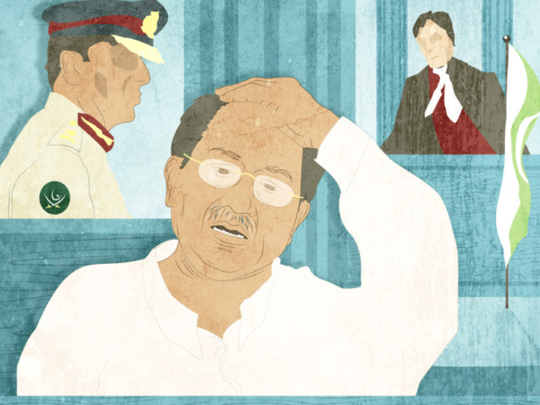
Last week’s indictment of Pakistan’s former military ruler General Pervez Musharraf on charges of high treason has been hailed by key members of the country’s civilian ruling structure as a moment of triumph for democracy.
The charges against Musharraf, which led to this outcome, stem from events in 2007. While presiding over Pakistan, Musharraf slapped emergency rule across the country to block growing opposition to his controversial decision of dismissing Iftikhar Mohammad Choudhary as chief justice of Pakistan’s Supreme Court.
In addition to being a step in a legal process, last week’s indictment has been given a wider meaning as a milestone in Pakistan’s journey from a military dominated state to a stable democracy.
Given that Pakistan has been ruled by influential army generals for almost half of its life as an independent state, not surprisingly this is the first ever indictment of a former army chief. Yet, if this historic event is being seen as a step towards Pakistan’s emergence from the army’s powerful shadow, that conclusion must be taken with a grain of salt.
Musharraf’s indictment was quickly followed by a reminder of Pakistan’s internal polarisation, when Prime Minister Nawaz Sharif’s government quickly dismissed a request by the former army ruler to travel to the UAE to visit his hospitalised mother.
The decision came as powerful reminder of the history between the two men. Though Musharraf was handpicked by Sharif in 1998 to become Pakistan’s army chief after the prime minister forced out General Jehangir Karamat as the army’s top man, relations between them soon soured.
The coup led by Musharraf in 1999 forced Sharif out of power as prime minister and led the way to his eventual exile to Saudi Arabia. Sharif’s eventual return to Pakistan and his entry to politics became possible in 2007 after Musharraf issued a controversial amnesty to individuals barred from running for political office.
Though Musharraf stepped down in 2008 and went into exile, his return to Pakistan in 2013 sparked yet another controversy. Some of his former comrades from the army even claimed that Musharraf returned in spite of being advised by the army to remain outside Pakistan.
However, as the two men now face off against each other, there are profoundly bigger issues confronting Pakistan than simply the merit or lack thereof of putting a former army chief on trial.
Notably, the matter of settling one of the worst security challenges to ever confront Pakistan along with the effects of a dysfunctional economy must count for being the key challenges whose eventual outcome will decide the country’s prospects for survival.
Since Sharif’s historic election as prime minister for the third time in May 2013, his government is yet to meet popular expectations on either of these crucial affairs.
On the former — the matter of national security — Sharif and his ruling party, Pakistan Muslim League - Nawaz (PML-N) have followed an apparent policy of appeasing the Taliban who have refused to lay down their arms after killing scores of Pakistanis over a decade.
Rather than overseeing a determined push to beat back the militants even if a set of negotiations had to be followed later, Sharif on the contrary has opted for launching what have become controversial negotiations with the Taliban.
Acute challenges
In this pursuit, precious time that could have been used to aggressively push back the Taliban from the space they have gained in the northern Khyber-Pakhtunkhwa province has indeed been lost. Late last Thursday came the announcement of the release of 19 Taliban prisoners held in Pakistan’s semi-autonomous Federally Administered Tribal Areas (Fata) on the Afghan border.
While key government officials defended the decision as a conciliatory step to facilitate the ongoing negotiations, others saw it as a further sign of Sharif’s continued appeasement of the Taliban.
Meanwhile, as Pakistan prepares to enter the scorching summer months across most of its territory, torturous electricity shortages are continuing to grow. It is indeed the most vivid example of an area where the authorities have virtually failed to even begin tackling a problem that must be central to the economy.
Going forward, resolving these acute challenges must be far more central to Pakistan’s future than Sharif’s determination to keep Musharraf in the dock.
In this pursuit, there is indeed a very significant risk, which is just not worth taking. The ruling structure’s decision to raise the pressure on Musharraf also promises to raise tensions with the Pakistan army.
So far, the army has not made any public comments on its view of Musharraf’s prosecution. Yet Pakistan’s media in the past few days has reported that General Raheel Sharif, the Army’s Chief of Staff, has advised Sharif to remove the restrictions on Musharraf’s travel outside the country. There are fundamentally vital reasons for the army to remain sceptical of Musharraf’s prosecution.
Fundamentally, a former army chief in the dock sets a precedent for other military figures to be similarly prosecuted in future. In an ideal world where everyone must be equal before the law, this outcome will indeed help Pakistan meet the ideals of democracy.
However, Pakistan is far from reaching such an ideal. On the contrary, the battle looming over the horizon is one that is essentially about the very survival of Pakistan.
A growing civil-military rift at this time will only make it harder for Pakistan to forge the unity that is necessary to beat back the Taliban. For Sharif, rising above his persona and his past has now become more critical than ever before for Pakistan to head towards a more promising future.
Farhan Bokhari is a Pakistan-based commentator who writes on political and economic matters.








